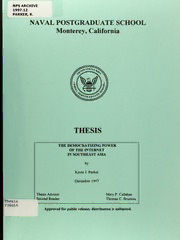
The democratizing potential of the Internet in Southeast Asia PDF
Preview The democratizing potential of the Internet in Southeast Asia
NPS ARCHIVE 1997.12 PARKER, K. NAVAL POSTGRADUATE SCHOOL Monterey, California THESIS THE DEMOCRATIZING POWER OF THE INTERNET IN SOUTHEAST ASIA by Kevin Parker J. December 1997 1'hesis Advisor: Mary P. Callahan •econd Reader: Thomas C. Bruneau Thesis P16654 Approved for public release; distribution is unlimited. DUDLEY KNOX LIBRARY NAVAL PO? GRADUATE SCHOOL MONTEREY CA 93943-5101 REPORT DOCUMENTATION PAGE FormApproved OMB No. 0704-0188 Publicreportingburdenforthiscollectionofinformationisestimatedtoaverage 1 hourperresponse, includingthetimeforreviewinginstruction, searching existingdatasources,gatheringandmaintainingthedataneeded,andcompletingandreviewingthecollectionofinformation. Sendcommentsregarding thisburdenestimateoranyotheraspectofthiscollectionofinformation, includingsuggestionsforreducingthisburden,toWashingtonheadquarters Services, DirectorateforInformationOperationsand Reports, 1215Jefferson Davis Highway, Suite 1204, Arlington, VA22202-4302, andtotheOfficeof Managementand Budget, PaperworkReduction Project(0704-0188)Washington DC20503. 1. AGENCYUSEONLY(leaveblank) 2. REPORTDATE 3. REPORTTYPEANDDATESCOVERED December 1997 Master's Thesis 4. TITLEANDSUBTITLE 5. FUNDINGNUMBERS THE DEMOCRATIZING POWER OFTHE INTERNET IN SOUTHEAST ASIA 6. AUTHOR(S) Parker, Kevin J 7. PERFORMINGORGANIZATIONNAME(S)ANDADDRESS(ES) 8O.RGPAENRIFZOARTMIIONNGREPORT Naval Postgraduate School NUMBER Monterey, CA 93943-5000 9. SPONSORING/MONITORINGAGENCYNAME(S)ANDADDRESS(ES) 10.SPONSORING/ MONITORING AGENCYREPORTNUMBER 11. SUPPLEMENTARYNOTES Theviews expressedinthisthesis arethoseofthe authoranddo not reflectthe official policyorpositionofthe Departmentof Defenseorthe U.S. Government. 12a. DISTRIBUTION/AVAILABILITYSTATEMENT 12b.DISTRIBUTIONCODE Approvedforpublic release; distribution isunlimited. 13. ABSTRACT (maximum 200 words) This thesis argues that the Internet is likely to be a strong, positive facilitating factor for the transition to and consolidation ofdemocracy for states in Southeast Asia. U.S. policy makers intent on promoting democracy in Southeast Asia shouldconsiderthe Internet'spotential asa tool forpromotingdemocratization. A review ofthe existing democratization literature, coupledwith quantitative analysis ofthe societal impact ofcomputer networkingtechnologies, suggests that the level ofInternet connectivity is a powerful indicatorofdemocratization. Compared to educationandincome, Internetconnectivityprovides greater statistical explanatorypowerinpredictingdemocracy. The Internet experience in Indonesia and Malaysia, two Southeast Asian states ruled by non-democratic authoritarian regimes, supports this argument. Interact expansion in both states has co-varied with increasing levels ofpolitical liberalization and this may enhance the prospects for democratic transition. Both states have abandoned strict controls on press freedom and free speechonthe Internet. Ademocracy assistance program designed to increase the level ofInternet connectivity in Southeast Asia may serve the purpose of promoting democracy while also advancing U.S. economic interests. Such a program may be viewed with less suspicionandas morepolitically neutral thantraditional formsofdemocracyassistance. 14. SUBJECTTERMS 15. NUMBEROF Democracy, Democratization, Internet, Southeast Asia. Malaysia, Indonesia PAGES 107 16. PRICECODE R17E.PSOERCTURITYCLASSIFICATIONOF T18H.ISSEPCAUGREITYCLASSIFICATIONOF O19F.ASBESCTURRAITCYTCLASSIFI-CATION 2O0F.ALBISMITTRAATCITON Unclassified UL Unclassified Unclassified NSN7540-01-280-5500 StandardForm298(Rev.2-89) PrescribedbyANSIStd.239-18 11 Approved for public release; distribution is unlimited THE DEMOCRATIZING POTENTIAL OF THE INTERNET IN SOUTHEAST ASIA Kevin J. Parker Lieutenant, United States Navy B.S., State University ofNew York, 1991 Submitted in partial fulfillment ofthe requirements for the degree of MASTER OF ARTS IN NATIONAL SECURITY AFFAIRS from the NAVAL POSTGRADUATE SCHOOL December 1997 \Wl.\T. DUDLEY KNOX LIBRARY NAVALPOSTGRADUATE SCHOOL MONTEREY CA 93943-5101 ABSTRACT This thesis argues that the Internet is likely to be a strong, positive facilitating factor for the transition to and consolidation of democracy for states in Southeast Asia. U.S. policy makers intent on promoting democracy in Southeast Asia should consider the Internet's potential as a tool for promoting democratization. A review of the existing democratization literature, coupled with quantitative analysis of the societal impact of computer networking technologies, suggests that the level of Internet connectivity is a powerful indicator of democratization. Compared to education and income, Internet connectivity provides greater statistical explanatory power in predicting democracy. The Internet experience in Indonesia and Malaysia, two Southeast Asian states ruled by non-democratic authoritarian regimes, supports this argument. Internet expansion in both states has co-varied with increasing levels ofpolitical liberalization and this may enhance the prospects for democratic transition. Both states have abandoned strict controls on press freedom and free speech on the Internet. A democracy assistance program designed to increase the level of Internet connectivity in Southeast Asia may serve the purpose ofpromoting democracy while also advancing U.S. economic interests. Such a program may be viewed with less suspicion and as more politically neutral than traditional forms ofdemocracy assistance. VI 8 . TABLE OF CONTENTS INTRODUCTION I. 1 A THE INTERNET AS A DRIVING SOCIAL FORCE 3 B. WHY SOUTHEAST ASIA? 5 C CAN THE INTERNET PROMOTE DEMOCRACY IN SOUTHEAST ASIA? .6 D DEFINITION, DESCRIPTION, HISTORY AND FEATURES OF THE INTERNET 7 H INTERNET AS A DEMOCRATIZINGFORCE 11 A WHAT DEMOCRACY? IS 11 B ESSENTIAL ELEMENTS OF DEMOCRATIZATION -LESSONS OF THE THIRD WAVE 14 C INTERNET MEETS THE THIRD WAVE - THEORETICAL PERSPECTIVES 1 1. Role ofInternet in the Transition to Democracy 20 2. Role ofInternet in the Consolidation ofDemocracy 38 3. A Common Thread 43 D INTERNET AND DEMOCRACY -QUANTITATIVE ANALYSES 45 III INTERNET AND DEMOCRACYIN SOUTHEAST ASIA 55 OVERVIEW A. 56 B ECONOMIC NECESSITIES 60 C GOVERNMENT ATTEMPTS TO CONTROL THE INTERNET 64 D. EFFECTS ON "ASIAN CULTURE" 67 IV CASE STUDIES -MALAYSIA AND INDONESIA 71 A.MALAYSIA 72 1. The Internet Arrives in Malaysia 74 2. Internet Effects Upon Malaysia's Autocracy 75 B.INDONESIA 77 1. Internet Arrives in Indonesia 78 2. Internet Effects on Autocracy 82 3. Civil Society 83 4. Implications for Democratization 84 V PROSPECTS/POLICY IMPLICATIONS 87 A. PROSPECTS 87 1 Continued Internet Expansion 87 2. Government Controls 88 B POLICY IMPLICATIONS 88 BIBLIOGRAPHY 91 INITIAL DISTRIBUTIONLIST 97 Vll nil
